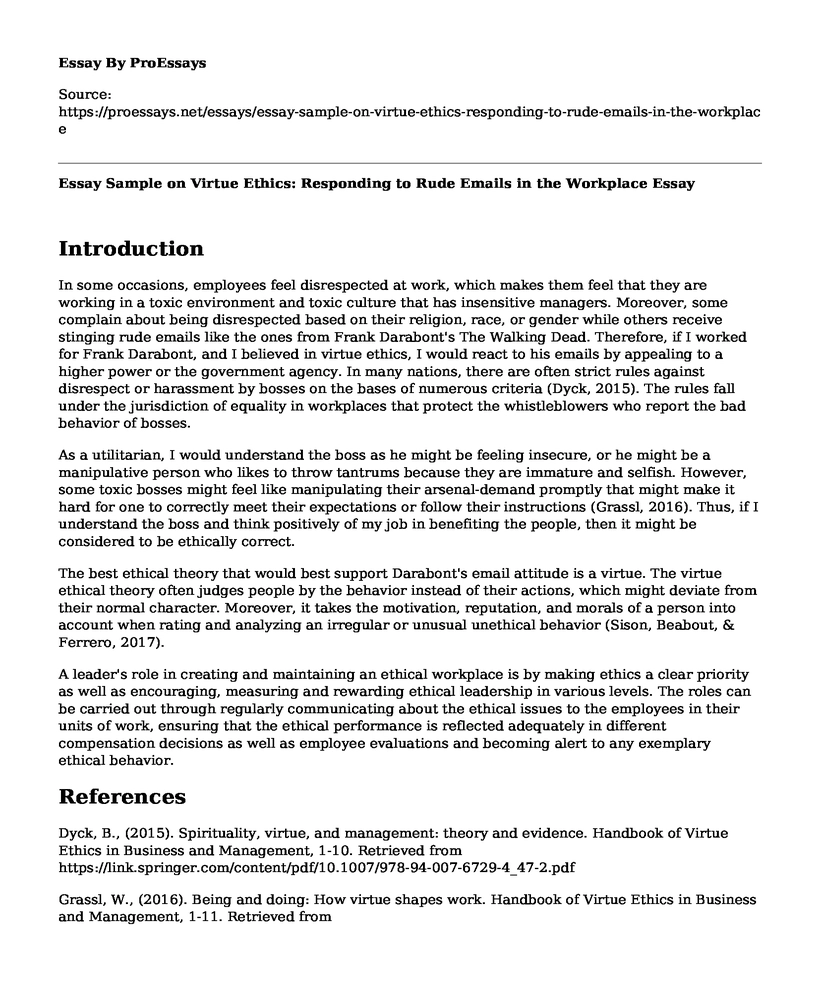Introduction
In some occasions, employees feel disrespected at work, which makes them feel that they are working in a toxic environment and toxic culture that has insensitive managers. Moreover, some complain about being disrespected based on their religion, race, or gender while others receive stinging rude emails like the ones from Frank Darabont's The Walking Dead. Therefore, if I worked for Frank Darabont, and I believed in virtue ethics, I would react to his emails by appealing to a higher power or the government agency. In many nations, there are often strict rules against disrespect or harassment by bosses on the bases of numerous criteria (Dyck, 2015). The rules fall under the jurisdiction of equality in workplaces that protect the whistleblowers who report the bad behavior of bosses.
As a utilitarian, I would understand the boss as he might be feeling insecure, or he might be a manipulative person who likes to throw tantrums because they are immature and selfish. However, some toxic bosses might feel like manipulating their arsenal-demand promptly that might make it hard for one to correctly meet their expectations or follow their instructions (Grassl, 2016). Thus, if I understand the boss and think positively of my job in benefiting the people, then it might be considered to be ethically correct.
The best ethical theory that would best support Darabont's email attitude is a virtue. The virtue ethical theory often judges people by the behavior instead of their actions, which might deviate from their normal character. Moreover, it takes the motivation, reputation, and morals of a person into account when rating and analyzing an irregular or unusual unethical behavior (Sison, Beabout, & Ferrero, 2017).
A leader's role in creating and maintaining an ethical workplace is by making ethics a clear priority as well as encouraging, measuring and rewarding ethical leadership in various levels. The roles can be carried out through regularly communicating about the ethical issues to the employees in their units of work, ensuring that the ethical performance is reflected adequately in different compensation decisions as well as employee evaluations and becoming alert to any exemplary ethical behavior.
References
Dyck, B., (2015). Spirituality, virtue, and management: theory and evidence. Handbook of Virtue Ethics in Business and Management, 1-10. Retrieved from https://link.springer.com/content/pdf/10.1007/978-94-007-6729-4_47-2.pdf
Grassl, W., (2016). Being and doing: How virtue shapes work. Handbook of Virtue Ethics in Business and Management, 1-11. Retrieved from https://link.springer.com/content/pdf/10.1007/978-94-007-6729-4_45-1.pdf
Sison, A. J. G., Beabout, G. R., & Ferrero, I. (Eds.). (2017). Handbook of virtue ethics in business and management. Dordrecht, the Netherlands: Springer. Retrieved from https://link.springer.com/referencework/10.1007%2F978-94-007-6510-8
Cite this page
Essay Sample on Virtue Ethics: Responding to Rude Emails in the Workplace. (2023, Jan 18). Retrieved from https://proessays.net/essays/essay-sample-on-virtue-ethics-responding-to-rude-emails-in-the-workplace
If you are the original author of this essay and no longer wish to have it published on the ProEssays website, please click below to request its removal:
- Patterns and Trends in Poverty and Affluence by Race and Ethnicity
- Marriage Therapy Assessment Paper Example
- Terrorism Liaison Officer's Decision Making Video Analysis
- Assigment Example on Enterprise Resource Planning of Business Process Systems
- Strategic Analysis of Campbell's Soup Company Paper Example
- Essay Sample on Leadership in Organizations: Integrating Qualities & Values for Effective Results
- Essay Sample on Enron's Epic Fail: Corporate Culture, Accounting & More







